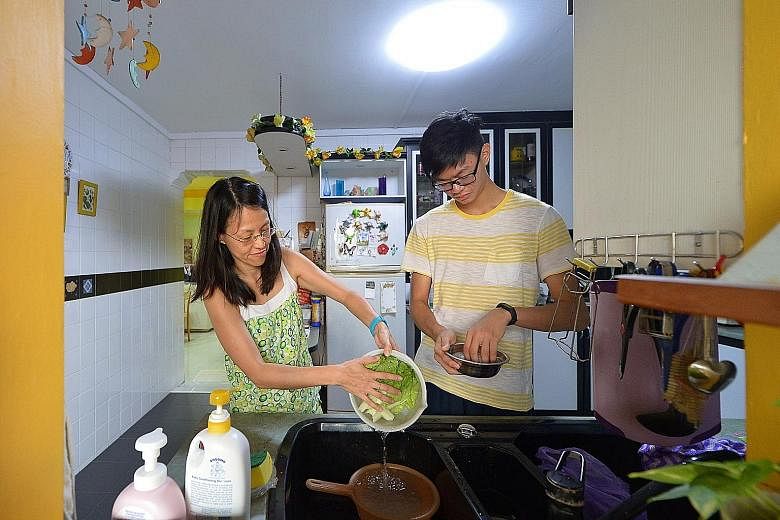Student Timothy Chan is in and out of the shower in less than five minutes, and he uses a mug when brushing his teeth instead of keeping the tap running.
For the 16-year-old, saving water is second nature.
But the Secondary 4 student appears to an anomaly among Singaporeans, according to a recent Straits Times poll of 20 people. Most said a water shortage is a prospect that is far from their minds.
One of them, administrative executive Affi Shah, 28, said: "I have not really thought about the possibility of Singapore not having enough water. Maybe it's because turning on a tap and expecting clean water has become such a natural thing."
Responses like hers underscore a challenge for Singapore: How to get people to save water when the country has achieved water sufficiency.
Last week, Prime Minister Lee Hsien Loong sought to drive home the urgency of conserving water when he posted on his Facebook page a photo of Linggiu Reservoir at 25 per cent of its full capacity.
-
WATER-SAVING TIPS
Take five-minute showers instead of 10-minute showers - save 45 litres
Brush teeth using a mug instead of a running tap - save 11.5 litres
Flush toilet using two full flushes and two half-flushes instead of four full flushes - save 3 litres
Wash dishes in a filled sink instead of under a running tap - save 28 litres
Use a washing machine rated three ticks - save 112 litres
Linggiu Reservoir - which is located in Johor but built and run by Singapore's national water agency PUB - collects and releases rainwater into the Johor River.
This pushes sea water back into the sea and ensures that the river water, which helps to meet half of Singapore's water needs, is not too salty to be treated by the Singapore-run water treatment plant there.
While Singapore has other sources of water - such as Newater, desalinated water and water from local reservoirs - to make up for the shortfall, Mr Lee said it is important to save water.
The good news is that most of the people polled by The Straits Times said they have been taking small steps to save water.
Housewife Vijaya Chadachan, 35, for example, said she has installed thimbles on her taps. The thimbles, which look like plastic buttons, limit the amount of water that flows out of the tap.
"We also try to limit the length of our showers," she added.
Others, like Timothy and his family, go a step further. At home, the Chans use water left over from cleaning vegetables to give their dirty dishes a first rinse, and dirty water from the family's fish tank is used to water the plants.
More recently, they too have installed thimbles on their taps and replaced their flush with one that has full-flush and half-flush functions.
But with water now seemingly readily available, there is little urgency for most people to save water.
Freelance market analyst Joanne Teo, 26, said: "I know there is a possibility of a water shortage but because we have not come close to water rationing for several decades, it just does not seem real."
Singapore has not had water rationing since 1964. Newater and desalination are able to meet up to 55 per cent of Singapore's water needs, and this can go up to 85 per cent by 2060, said PUB.
Over the years, there has been some progress in reducing water usage at home. Residential water consumption for each person on a single day in Singapore has fallen from 175 litres in 1994 to 151 litres today.
But it is still short of targets set by PUB. The goal is to reduce water consumption to 147 litres a person each day by 2020.
Earlier this year, when a prolonged dry spell led to water rationing in several Malaysian states, Environment and Water Resources Minister Masagos Zulkifli said Singaporeans cannot rest on their laurels.
Total water demand here, which stands at about 430 million gallons a day, is likely to double by 2060, said PUB. This includes industry use.

